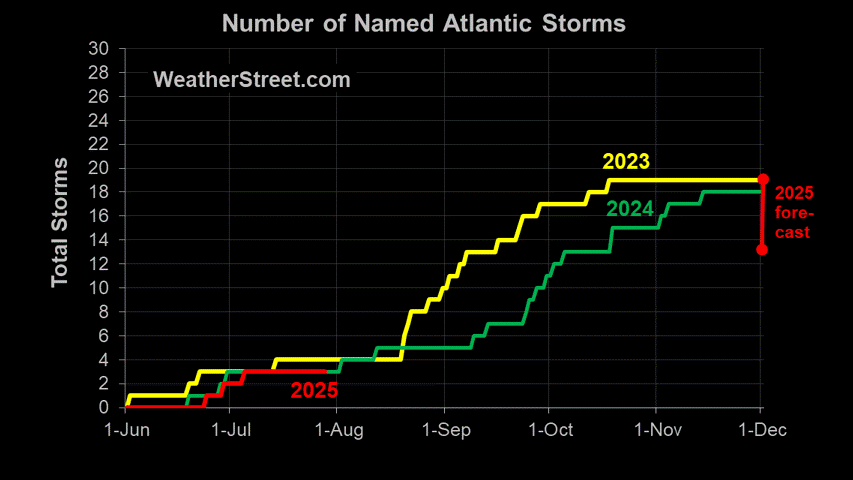Global Warming causes FEWER hurricanes
A new study by NOAA now indicates that the effects of global warming is actually resulting in fewer hurricanes in the Atlantic Basin. Warmer ocean waters are usually associated with an increase in the number of storms that develop into hurricanes and an increase in the intensity of those storms. Something that has not been discussed as much is that the same warmer waters also generates an increase in wind shear. So while the potential for a storm to increase in strength grows with warmer water temperatures, shearing winds also increase tearing those same storms apart.
A warming global ocean — influencing the winds that shear off the tops of developing storms — could mean fewer Atlantic hurricanes striking the United States according to new findings by NOAA climate scientists. Furthermore, the relative warming role of the Pacific, Indian and Atlantic oceans is important for determining Atlantic hurricane activity.
The article, to be published on January 23 in Geophysical Research Letters, uses observations to show that warming of global sea surface temperatures is associated with a secular, or sustained long-term increase, of vertical wind shear in the main development region for Atlantic hurricanes. The increased vertical wind shear coincides with a downward trend in U.S. landfalling hurricanes.
This helps to explain why for the past two years predictions for an active tropical season have fallen short with wind shear taking the blame for the lack of storm activity. In general, we have seen consistently warm sea surface temperatures over the past several years. Yet 2006 and 2007 were rather mild while 2004 and 2005 were terrible. I think it is accurate to say that the water temperature has been consistently warm through all four summers. So why was the storm activity so different?
The increase in wind shear explains this effect and was clearly seen this past summer when storms would form and then break apart just when they should have intensified.
In terms of hurricane strength, Wang notes, “The vertical wind shear is not the only factor affecting Atlantic hurricane activity, although it is an important one.” Other factors include atmospheric humidity, sea level pressure, and sea surface temperature.Other factors include the amount of dust in the air (as we saw in 2006) influence of other low pressure systems and fronts especially as a storm approaches landfall, the multidecadal cycle and El Nino/La Nina patterns.
Those who point to the warming of the oceans as evidence that global warming will result in more stronger hurricanes are over simplifying the situation. As we have seen these past two years, such a comparison is not realistic.
This study shows that over a longer time period, a causal effect can be seen between wind shear and ocean temperatures.
Observations from 1854 to 2006 show a warming of sea surface temperature occurring almost everywhere over the global ocean, with large warming in tropical regions of the Pacific, Atlantic, and Indian oceans. Warmer waters in the tropical Pacific, Indian and North Atlantic oceans produce opposite effects upon vertical wind shear; that is, warming in the tropical Pacific and Indian oceans increase vertical wind shear in the Atlantic hurricane main development region, while warming in the tropical North Atlantic decreases vertical wind shear. Overall, warming in the Pacific and Indian oceans is of greater impact and produces increased levels of vertical wind shear which suppresses Atlantic hurricane activity.Warming of the oceans has apparently been occurring over the past 14 decades according to this data, yet the Atlantic hurricane activity has fluctuated many times from low activity to high and back again. This clearly shows that a direct link between global warming and hurricane activity is an oversimplification at best.

Trackposted to Outside the Beltway, The Virtuous Republic, Rosemary's Thoughts, Right Truth, The Pet Haven Blog, Shadowscope, Stuck On Stupid, Leaning Straight Up, Adeline and Hazel, Pursuing Holiness, A Newt One- The Truth Surge, Pet's Garden Blog, Woman Honor Thyself, Pirate's Cove, The Pink Flamingo, A Newt One, Dumb Ox Daily News, Right Voices, http://morewhat.com/wordpress/?p=2908, A Blog For All, 123beta, Big Dog's Weblog, Cao's Blog, Conservative Cat, Diary of the Mad Pigeon, Nuke Gingrich, Allie is Wired, The Crazy Rants of Samantha Burns, The World According to Carl, Blue Star Chronicles, Wolf Pangloss, CORSARI D'ITALIA, and OTB Sports, thanks to Linkfest Haven Deluxe.









<< Home